70 Iron Rich Foods, Fruits & Vegetables to Include in Your Diet
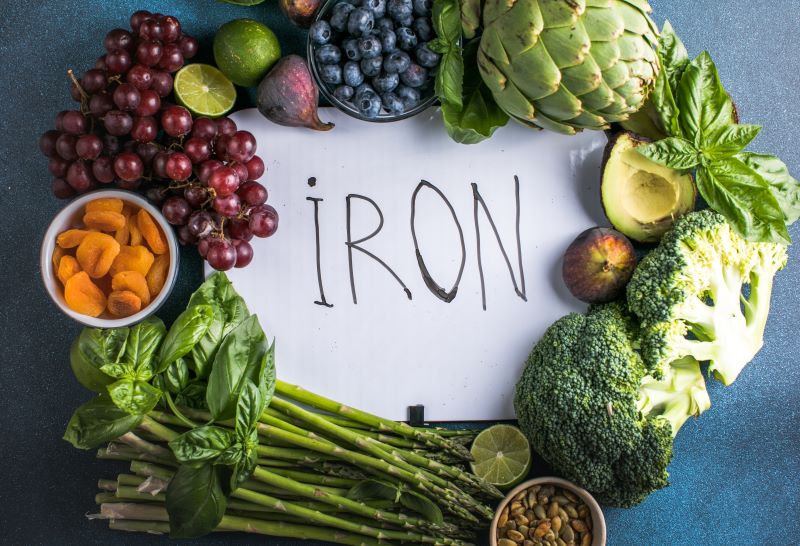
It is important to ensure that you have enough iron in your diet as this essential mineral plays key roles in numerous body functions such as transportation of oxygen, energy production and supporting the immune system. Not only does incorporating Iron Rich foods into the diet help manage iron deficiency anaemia, but it also promotes overall well-being.
Various types of Iron Rich foods are available, from leafy vegetables like kale and spinach to iron-packed options like lean meat and legumes; nature has a solution for everyone’s dietary needs. Incorporating fruits or vegetables that contain vitamin C into meals could be beneficial for individuals because it increases the absorption rate of iron and ensures that most benefits are realised.

Table of Contents

What is Iron?
Iron, an essential mineral found in abundance in nature, is the building block of life and maintains the proper functionality of the body. It is famous for being a crucial element in blood cells’ oxygen transportation, energy generation, immunity, and brain functioning.
Iron is an essential nutrient that exists in various forms, both in food sources and within the human body. It plays an important role in enzymatic reactions and cellular activities, which are indispensable for good health. It also aids in the production of haemoglobin, which is important for carrying oxygen.
What are the Sources of Iron?
Iron comes from animal and plant foods, such as red meat, poultry, fish, eggs, etc., while plant-based sources include legumes like tofu, soybeans, fortified cereals, spinach, and nuts.
These contain heme and non-heme iron, which are better absorbed by our bodies. Moreover, combining vitamin C-rich foods with high iron content improves absorption.
Additionally, supplements are available for people with dietary limitations or who may require extra iron, but it is best to first see a doctor.
Top 70 Food Items High in Iron
Discover the top 43 food items rich in iron, vital for maintaining optimal health and vitality. From meats to vegetables, this comprehensive list will help you ensure you're getting enough of this essential mineral in your diet.
List of Iron Rich Vegetables
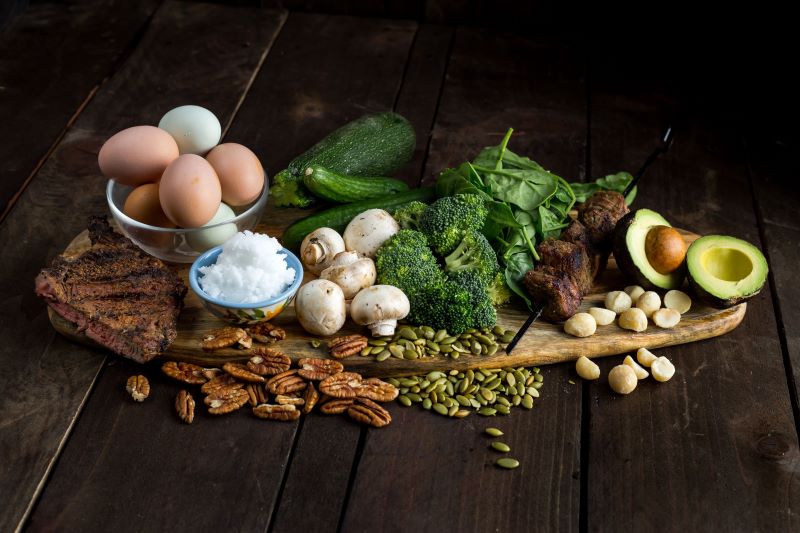
Explore a variety of nutrient-packed options with our curated list of Iron Rich vegetables, offering essential dietary sources for maintaining optimal health and vitality.
SNo. |
Vegetables | Iron Content in mg |
| 1 | Spinach | Highly rich in iron-containing 2.7 mg per 100 grams |
| 2 | Kale | A great source of iron containing 1.5 mg per 100 grams |
| 3 | Swiss chard | 1.8 mg iron in 100 grams in chard |
| 4 | Beet greens | Rich in iron with 2.5 mg content per 100 grams |
| 5 | Broccoli | A small amount of iron of 0.7 mg in 100 grams |
| 6 | Brussels sprouts | A small quantity of 0.9 mg of iron in 100 grams |
| 7 | Asparagus | Great source for iron intake with 2.1 mg in 100 grams |
| 8 | Green peas | Iron Rich legume containing 1.5 mg iron in 100 grams |
| 9 | Soybeans | Containing 15.7 mg of iron in 100 grams. |
| 10 | Edamame | Consisting of 2.1 mg iron in 100 grams |
| 11 | Kidney beans | Iron-dense beans containing 2.2 mg in 100 grams |
| 12 | Black beans | Abundant in iron with 2.5 mg per 100 grams |
| 13 | Green beans | A great source of dietary iron containing 1.03 mg per 100 grams |
| 14 | Peas | Iron Rich vegetable pertaining 1.5 mg iron in 100 grams |
| 15 | Mushrooms | Moderate iron content of 0.5 mg in 100 grams |
| 16 | Sweet potatoes | Iron-containing root vegetable with 0.61mg iron per 100 grams |
| 17 | Potatoes | A small amount of 0.81 mg iron per 100 grams |
| 18 | Beetroot | A very tiny amount of 0.8 mg iron in 100 grams |
List of Fruits Rich in Iron
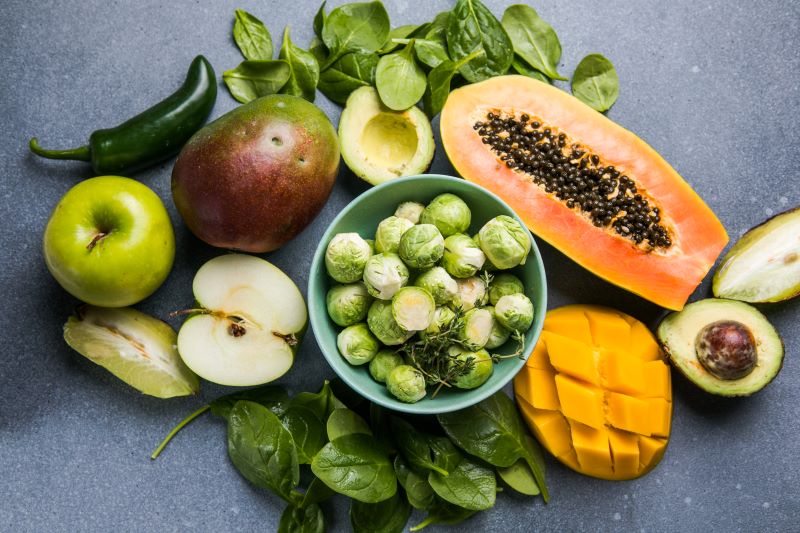
Discover an array of delicious and nutritious options with our comprehensive list of fruits rich in iron, providing essential nutrients for a balanced diet.
SNo. |
Fruits | Iron content in mg per 100 grams |
| 19 | Mulberries | 1.8 mg in 100 grams |
| 20 | Kiwi | 0.3 mg in 100 grams |
| 21 | Guava | 0.2 mg in 100 grams |
| 22 | Prickly pear | 0.3 mg in 100 grams |
| 23 | Pomegranate | 0.3 mg in 100 grams |
| 24 | Watermelon | 0.2mg in 100 grams |
| 25 | Blackberries | 0.6 mg in 100 grams |
| 26 | Strawberries | 0.3 mg in 100 grams |
| 27 | Blueberries | 0.3mg in 100 grams |
| 28 | Cherries | 0.4 mg in 100 grams |
| 29 | Bananas | 0.3 mg in 100 grams |
| 30 | Pineapple | 0.3 mg in 100 grams |
| 31 | Grapes | 0.4 mg in 100 grams |
| 32 | Cranberries | 0.4 mg in 100 grams |
List of Cereals and Dairy Products Containing Iron
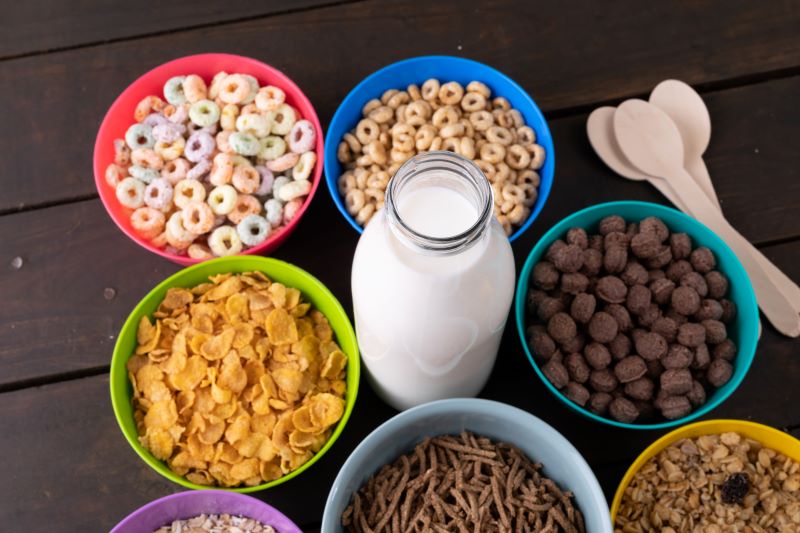
Start by choosing from a range of cereals as well as dairy products which have been enriched with iron to support you nutritionally every day.
SNo. |
Cereals and Dairy products | Iron in mg |
| 33 | Oatmeal | 3.4 mg in 1 cup serving |
| 34 | Wheat flakes | 4.2 mg in 1 cup serving |
| 35 | Bran flakes | 11.3 mg in 1 cup serving |
| 36 | Fortified oat milk | 4 mg in 1 cup serving |
| 37 | Fortified soy milk | 1-2 in 1 cup serving |
| 38 | Yoghurt | 0.8 mg in 1 cup serving |
| 39 | Cheese | 0.2 mg in 1 slice |
| 40 | Cottage cheese | 0.4 in 1 cup serving |
| 41 | Fortified yoghurt | 1.5 mg in 1 cup serving |
List of Seeds and Nuts Rich in Iron
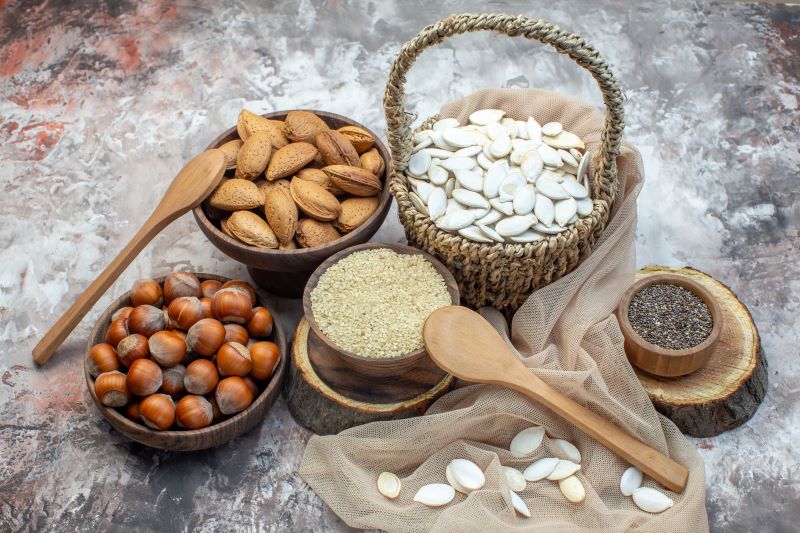
Come across a rich variety of seeds and nuts which are high in iron thus providing an easy way to increase ferrous consumption. Here are a few options:
SNo. |
Seeds and Nuts | Iron in mg per 100 grams |
| 42 | Pumpkin seeds | 8.8 mg per 100 grams |
| 43 | Sesame seeds | 14.6 mg per 100 grams |
| 44 | Sunflower seeds | 5.3 mg per 100 grams |
| 45 | Hemp seeds | 7.5 mg per 100 grams |
| 46 | Flaxseeds | 5.7 mg per 100 grams |
| 47 | Chia seeds | 7.7 mg per 100 grams |
| 48 | Almonds | 3.7 mg per 100 grams |
| 49 | Cashews | 6.7 mg per 100 grams |
| 50 | Pistachios | 3.9 mg per 100 grams |
| 51 | Pine nuts | 5.5 mg per 100 grams |
List of Animal and Seafood High in Irons
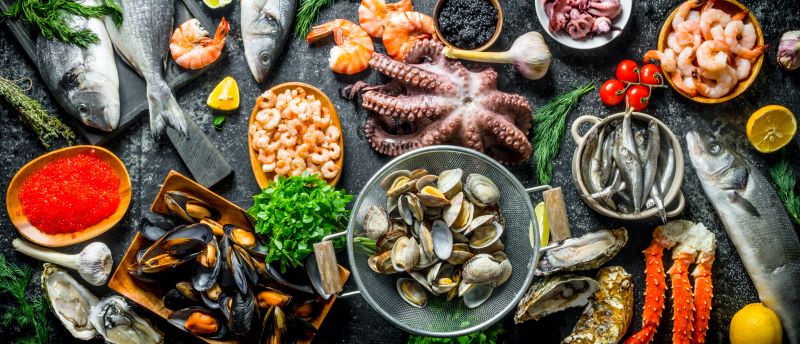
Look into the different types of animal tissues and sea animals which are full of ferrum essential for normal functioning of the body. Here are some of the Iron Rich animals and seafoods:
SNo. |
Animal and Seafood | Iron Content in mg per 100 grams |
| 52 | Beef (lean cuts) | 2.6 mg per 100 grams |
| 53 | Lamb (lean cuts) | 2.5 mg per 100 grams |
| 54 | Pork (lean cuts) | 0.9 mg per 100 grams |
| 55 | Chicken (dark meat) | 1.1 mg per 100 grams |
| 56 | Turkey (dark meat) | 1.4 mg per 100 grams |
| 57 | Duck (lean cuts) | 2.3 mg per 100 grams |
| 58 | Liver (beef) | 6.5 mg per 100 grams |
| 59 | Liver (chicken) | 9.9 mg per 100 grams |
| 60 | Oysters | 5.7 mg per 100 grams |
| 61 | Clams | 28.0 mg per 100 grams |
| 62 | Mussels | 6.7 mg per 100 grams |
| 63 | Octopus | 2.2 mg per 100 grams |
| 64 | Sardines (canned) | 2.9 mg per 100 grams |
| 65 | Tuna (canned) | 1.1 mg per 100 grams |
| 66 | Shrimp | 2.6 mg per 100 grams |
| 67 | Salmon | 0.6 mg per 100 grams |
| 68 | Trout | 1.0 mg per 100 grams |
| 69 | Crab | 1.5 mg per 100 grams |
| 70 | Lobster | 1.1 mg per 100 grams |
Stay on Track with These Health Tools
How much Iron should you intake?
According to the RDA (Recommended Dietary Allowance) given by the Harvard School of Public Health, it is essential to determine the appropriate intake of iron per day. The factors vary according to age, sex, and life stage.
The table given below outlines the recommended daily intake of Iron for different demographics:
Age Group |
Recommended Iron Intake (milligrams per day) |
| Infants 0-6 months | 0.27 mg |
| Infants 7-12 months | 11 mg |
| Children 1-3 years | 7 mg |
| Children 4-8 years | 10 mg |
| Children 9-13 years | 8 mg |
| Male Teens 14-18 years | 11 mg |
| Female Teens 14-18 years | 15 mg |
| Male Adults 19-50 years | 8 mg |
| Female Adults 19-50 years | 18 mg |
| Pregnant Teens/ Adults | 27 mg |
| Lactating Teens/ Adults | 10 mg |
| Adults 51+ years and older | 8 mg |
Health Benefits of Iron Rich Foods in your Diet
Good health can be achieved by adding Iron Rich foods to your menu that will increase your energy levels, brain power and immunity. These are packed with nutrients that are essential for general well-being. The following are the health benefits of incorporating foods that are rich in iron into your diet.
- Prevention of Anaemia: Iron is necessary for making haemoglobin which transports oxygen in red blood cells; hence it helps in preventing iron-deficiency anaemia.
- Boosts Energy Levels: A good amount of iron intake helps to produce energy, reducing tiredness and increasing life.
- Supports Cognitive Functioning: Developing cognitive ability and maintaining brain function relies on the availability of adequate amounts of iron.
- Enhances Immune System: Iron plays a vital role in supporting immunity, thus helping to protect the body against infections and diseases.
- Promotes Muscle Functioning: It contributes to muscle metabolism to gain strength and improve endurance rate through its involvement in muscle metabolism.
- Encourages Healthy Pregnancy: Enough iron during pregnancy supports healthy growth of the foetus and minimises complications during childbirth.
- Improves Concentration Ability: An adequate supply of oxygen to the brain requires the presence of iron, which makes one attentive.
- Supports Healthy Hair And Skin: The element has a part to play in the synthesis of Irons needed for sound hair, skin plus nails.
- Regulates Body Temperature: It ensures efficient oxygen transport thus enabling body temperature regulation.
- Facilitates Wound Healing: This mineral takes part in developing collagen making wound healing faster while tissues re-grow.
Different Ways to Include Iron Rich Foods in Your Diet
Ensure an adequate amount of iron by integrating Iron Rich foods into your meals, which are enjoyable and healthy. Below, you’ll find ways to do it.
- Blend in Greens: A green smoothie packed with nutrients that includes spinach, kale or Swiss chard is a good way to start the day with a refreshing burst of iron.
- Stir up Veggies: Use various vegetables such as bell peppers, broccoli and bok choy which are rich in iron to make colourful stir-fries vibrant.
- Salads Full of Power: Get more from your salads by adding beans, lentils, nuts, seeds and dried fruits for an extra helping of iron.
- Fortify Breakfast: Try fortified breakfast cereals topped with milk or yoghurt and sliced bananas or berries for a substantial morning meal.
- Seafood Delicacies: Treat yourself to delicious seafood dishes like grilled salmon, shrimp stir fry among others for increased iron intake.
- Whole Grains: Wholesome grains like quinoa barley farro can be used as a nutritious base for salads, grain bowls, side dishes etcetera.
- Nutrient-Packed Snacks: These include roasted chickpeas, pumpkin seeds and almonds that are easily accessible to keep you full throughout the day, also ensuring daily iron intake.
- Plants Irons: With plant-based Irons such as tofu tempeh, and edamame try out recipes that involve curries stir-fries Buddha bowls and boost your consumption of irons.
- Cook With Cast Iron: Cook in an iron-coated cookware to naturally boost iron intake in the body, especially in acid-based foods like tomato sauce or chilli sauce.
What are the Symptoms of Iron Deficiency?
Low levels of iron in the blood can lead to a variety of symptoms since this mineral is very important for oxygen transportation throughout the body. When not treated, it may result in iron deficiency anaemia and affects various processes within the body. The following are some common signs:
What are the Health Risks of Not Getting Enough Iron?
Iron deficiency can lead to significant health risks if not treated, affecting multiple body systems. Some of these are explained below:
- Iron-Deficiency Anaemia: Decreased iron content is called iron-deficiency anaemia in which red blood cell number is low and the ability to carry oxygen is decreased leading to tiredness and weakness.
- Impaired Cognitive Function: Cognitive function may be impaired by insufficient levels of iron thereby affecting memory, concentration and overall mental alertness.
- Reduced Exercise Performance: Inadequate amounts of iron delivery during exercise would compromise oxygen supplies to muscles resulting in low exercise performance and endurance.
- Compromised Immune Function: Iron deficiency weakens the immune system making it more prone to infections and diseases.
- Developmental Delays in Children: Infants and young children suffering from iron deficiencies will show growth retardation associated with developmental delays or cognitive disability.
- Pregnancy Complications: Women who are pregnant with low levels of iron are predisposed to complications such as preterm birth, low birth weight, and maternal anaemia among other disorders.
- Increased Fatigue and Weakness: Because of that, individuals’ energy levels wane over time while they feel exhausted at all times which hampers daily activities thus impairing their quality of life.
- Hair Loss plus Brittle Nail: Inadequate iron leads to hair loss, hair thinning, and brittle nails ultimately affecting physical appearance and self-esteem.
- Cardiovascular Problems: Decreased iron content increases the risk of heart problems like irregular heartbeats, palpitations and heart failure.
What are the Side Effects of Excessive Iron Intake?
While iron is important to health, consuming it excessively can have adverse effects on the body. Here are some potential side effects of taking in too much iron:
- Gastrointestinal Distress: Excessive amounts of iron can cause stomach aches, pains, nausea, throwing up and diarrhoea.
- Constipation: Consuming too many iron supplements or foods rich in this mineral may lead to constipation and difficulties passing stools.
- Iron Toxicity: High levels of iron in your body are called iron toxicity or overdose can damage organs such as the liver, heart, and pancreas.
- Liver Damage: The accumulation of excess amounts of iron in the liver may lead to liver damage and an increased risk for diseases such as cirrhosis and hepatocellular carcinoma.
- Heart Problems: Iron overload can affect the heart, leading to an increased risk of cardiovascular problems such as irregular heartbeats, palpitations, and even congestive heart failure.
- Joint Pain: Symptoms similar to arthritis including joint pain, stiffness, and inflammation may occur when there is an excessive intake of iron.
- Bronze Skin Colour: Under severe circumstances like bronze diabetes, deposition of excessive quantities of Fe within the skin gives a bronzy or greyish colouration.
- Diabetes Risk: Increased amounts of this mineral have been associated with a higher prevalence of type 2 diabetes mellitus and insulin resistance syndrome.
- Hormonal Imbalance: Overabundance of Fe interferes with hormonal regulation thereby affecting reproductive health including menstruation.
Should You Take an Iron Supplement?
Determining whether to take an iron supplement depends on personal health and eating habits, which a healthcare provider should monitor. People with iron deficiency anaemia, pregnant women, those who do not eat animal products, and individuals with conditions that interfere with iron absorption are usually advised to take supplements. Assessing your general health condition is necessary to find whether you need supplementation.
For most people, a balanced diet, including foods rich in iron, is the best way to go, but for some, this may not be enough, especially when there are factors such as dietary restrictions or increased demands for iron (iodine). In such cases, one can look into taking supplements to fill the gap and ensure optimal amounts of iron are maintained within the body. Nevertheless, it is essential that one balances between supplementation and meals while avoiding excessive amounts that may exceed the recommended daily intake (DRI).
A doctor’s directive in choosing an iron supplement must come from a thorough examination. Among other things, they can use blood tests to correctly determine if someone requires extra minerals, plus give advice about how much dosage they should take or for how long.
Summarily, for optimum well-being and health, it is important to note that consuming foods rich in iron is vital. Whether one is on a plant-based diet or obtains nutrients from animal products, having these nutrient-packed meals guarantees that one has enough iron in the body, which leads to deficiency prevention and the promotion of ultimate well-being. A medical professional can also be consulted to personalise dietary recommendations according to individual requisites.
Protect What Matters - Explore Other Insurance Options














